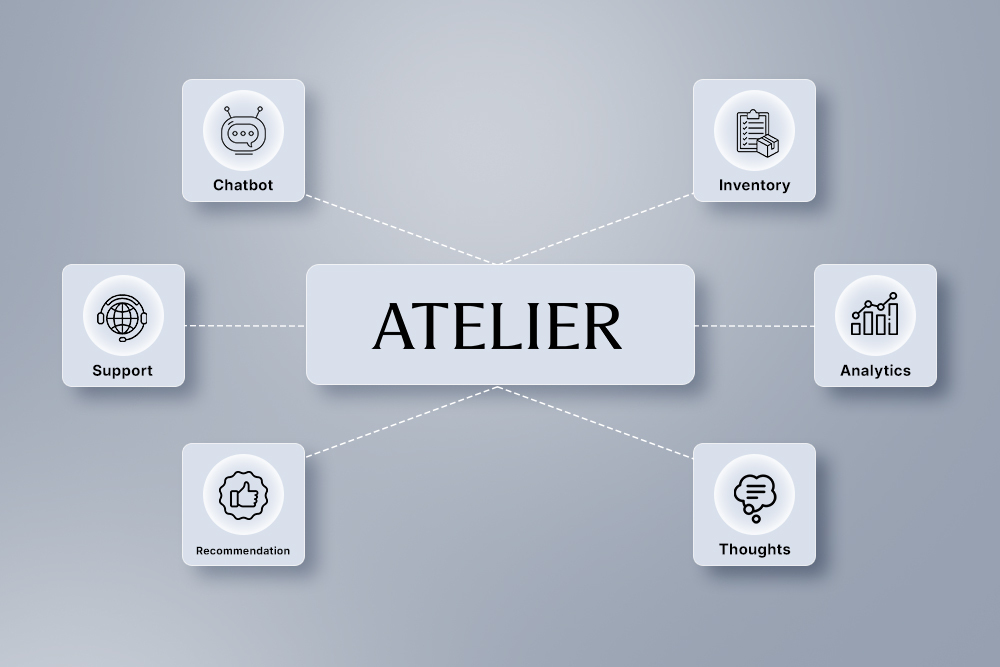”Running an online store today means facing fierce competition, high costs, and demanding customers. If you’re not already using AI, you’re missing an opportunity to grow smarter, faster, and more efficiently. In 2025, AI is the engine that powers scaling for small boutiques and large businesses.
Why use AI in your E-commerce Business?
Effectively leveraging AI in ecommerce uses artificial intelligence to:
- Automate decisions – like when to update prices or reorder stock
- Personalize every shopper’s experience – from product picks to marketing
- Predict trends – so you stay ahead of what customers want
This setup turns gut-feel choices into data-driven actions, letting your store grow without burning more time or resources. Think of it as maximizing your time, creating processes that solve lower yield, lower priority tasks – as well as those which require additional perspective from an AI.
Why AI Matters in 2025

Ecommerce is evolving fast. Customers expect speed, relevant offers, and seamless service. Meanwhile, costs and competition are rising. AI in ecommerce helps cut costs and boost revenue it’s now key to staying competitive. Here’s how AI can help grow your ecommerce business:
- Save staff time by automating repetitive tasks
- Cut errors in pricing, stock, and orders
- Scale smoothly with systems that work 24/7
AI Benefits Across Major Business Areas
AI brings valuable improvements across key parts of an ecommerce business, helping to streamline operations, enhance customer experience, and increase profits.
A. Marketing & Sales Optimization
- Smart ad tools automatically shift budgets to top-performing campaigns
- Generative AI creates or refines email copy, ads, and product descriptions
- Advanced lead scoring identifies high-converting customers
B. Personalization & Shopping Experience
- Recommendation engines increase cart value by 20–35%
- Dynamic content adjusts site banners, product lists, and offers per visitor
- Personalized journeys build loyalty and increase conversion
C. Inventory & Pricing Intelligence
- Demand forecasting AI predicts which products to restock
- Dynamic pricing adjusts prices based on demand, inventory, competition, and even weather
- Avoid overstock or stockouts with smarter inventory control
D. Customer Support
- AI Chatbots for e‑commerce manage FAQs, order tracking, and returns 24/7
- They handle routine questions so your team can focus on higher-level support
AI E-commerce Business Strategy: Before vs. After
Let’s see how ecommerce operations look with and without AI to understand the difference AI truly makes.
| Traditional Business | AI-Powered Business |
| Hire more staff | Chatbots and AI handle routine support and tasks |
| Manual ad tests | AI runs hundreds of ad variations simultaneously |
| Guess inventory needs | AI forecasts demand and automates stock orders |
| Static-pricing models | Dynamic pricing adjusts in real time |
| Content created by hand | Generative AI writes descriptions and ads automatically |
Real-Life AI Success Stories
Here are some real examples of ecommerce businesses using AI to grow smarter and faster.
- Small fashion brand: Deployed AI chatbots and reduced support costs by 60%
- Home furnishings store: AI predicted stock needs and cut excess inventory by 40%
- Beauty retailer: Personalized recommendations increased repeat purchases by 30%
AI Ecommerce Business Models & Strategy

Using the right AI Tools to Grow Your e-commerce business is a key part of any smart AI ecommerce business model and strategy today. AI is changing how online stores operate, scale, and compete in the 2025 ecommerce market.
Start with One Key Area
Focus on a problem you want to fix, like support or pricing, and apply AI there first.
Use the Right Tools
Explore solutions like:
- Chatbots (ManyChat, Tidio)
- Google Ads AI
- Virtual try-on or product recommendation engines
Expand and Improve
Once one system works, add another, such as AI-supported inventory or pricing. Build step by step.
How to Track Your AI Success
Choose measurable goals:
- % drop in support tickets
- Average cart value or conversion rate increase
- Reduction of overtime or manual task time
- Stock accuracy and turnover rate
Keep measuring so you can improve AI settings and scale further confidently.
Final Thoughts
In 2025, scaling an ecommerce business isn’t just a side hustle, it’s about intelligent systems. AI is the key:
- Automates routine tasks across the board
- Personalizes shopping for each visitor
- Optimizes inventory, pricing, and marketing in real time
- Manages support without extra staff
To scale your ecommerce with confidence, start small, track your results, and build up. AI is the key to scaling your ecommerce business, let it carry the heavy lifting while you focus on what matters the most.


